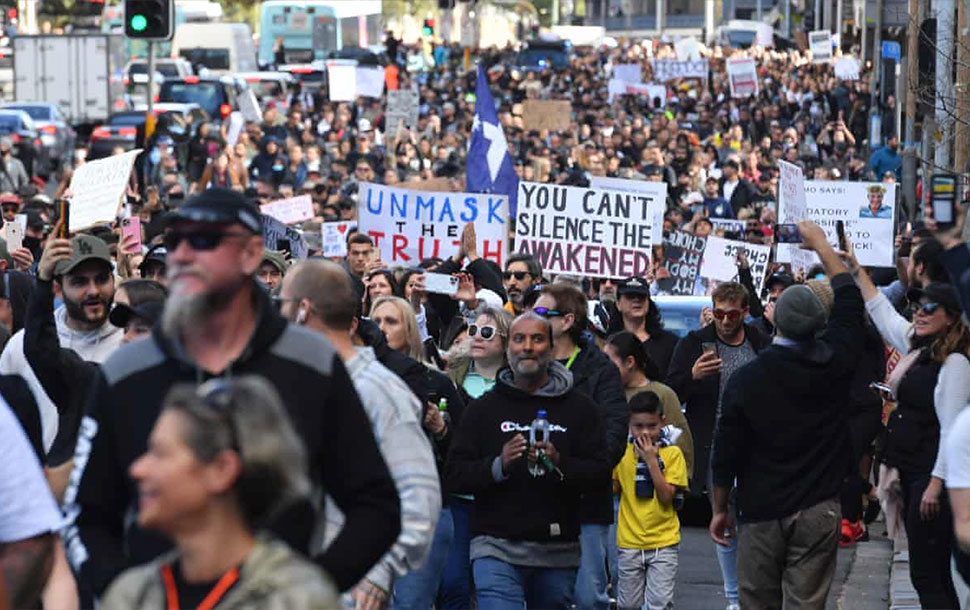The public health measures put in place in Australia in response to COVID-19 have prompted a range of responses from Christians. In discussions about how to respond the ideas of ‘conscience’ and ‘freedom (or liberty) of conscience’ often come up. In this four-part series, the GiST team takes a fresh look at conscience and liberty of conscience, and asks the question, “Are they Christian ideas?’
In this, the second part of this series, we ask the question…
What is ‘liberty of conscience’ in the Bible?
Any discussion of ‘liberty of conscience’ in the Bible ought to be set in the context of ‘liberty’ in the Bible generally. In short, in the Bible Christian liberty is the freedom to live life according to God’s ways, free from the ruling power of sin in this life and the condemnation of God in the next (c.f. Luke 1:74-75, Gal.5:1,13, 1Pet.2:16). This is not an unrestricted (antinomian) freedom, but rather freedom within God’s good boundaries – the kind of freedom a fish experiences by being ‘restricted’ to water.[1]
A key summary passage on liberty of conscience in the Bible is Romans 14:1-15:6. While the phrase ‘liberty of conscience’ does not appear in the passage, the concept is very much there. Christians with a better-informed conscience (the ‘strong’ 15:1) are not to despise or fail to include Christians with a lesser informed conscience (the ‘weak’ 14:1-3, 15:1), nor are they to do anything that might cause their weaker-conscience fellow Christian to stumble in his or her faith (14:13). Specifically for the ‘strong’ in this passage, this means voluntarily restricting their freedom to eat, in order to prevent the perception on the part of weaker-conscience Christians that the strong are endorsing idolatry.[2] The weak, in turn, are not to pass judgement on the strong if they do see them eat (14:3-4).
It is important to note though that the voluntarily laying down of freedoms by the strong has limits. In Paul’s letter to the Galatians, where weak-conscience Christians have gained a position of strength in the church, they seek to impose on the strong restrictions that are additional to God’s Word. In that case the weak are actively to be resisted (Galatians 2:3-5) since to submit to such restrictions as if they were God’s commands (i.e. out of conscience) actually undermines God’s truth – in this case (and most importantly) the truth of the gospel.[3]
In summary then, liberty of conscience in the New Testament is freedom to act according to conscience, without being despised, caused to stumble, condemned, or not welcomed by your fellow Christians. It is the freedom we receive from our fellow Christians to act in accordance with our conscience even when it is still poorly informed, since the shaping of people’s consciences by God’s word takes time. It is the freedom we extend to our fellow Christians by voluntarily laying down our freedoms in Christ for their good. However, our freedom in Christ must not be laid down when restriction of it is imposed as if such restrictions were the command of God.[4]
Liberty of conscience and the Westminster Confession
It is important to see that in both Romans 14-15 and 1Cor.8-10 the context is the church. Later Christian thinkers though, and from the Enlightenment onwards increasingly secular thinkers, sought to apply the concept of liberty of conscience not only in the church but to society more broadly.
Published in 1646, the Westminster Confession of Faith (WCF)[5] addresses liberty of conscience, retaining a focus on the church but also drawing out implications beyond it. The key sentence is in WCF 20.2, which reads, “God alone is Lord of the conscience, and has left it free from the doctrines and commandments of men which are in any thing contrary to his Word, or beside it in matters of faith or worship.”
In saying this the WCF divides life into two areas – or rather, one all-encompassing area (‘any thing’) and one sub-area (‘matters of faith or worship’). England in 1646 was in the midst of a civil war (or a series of civil wars) which had been sparked, in part, by the Roman Catholic tendencies of King Charles I under whose rule a creeping tendency towards various Roman Catholic practices had progressed in the English church. There were also present in England at that time a variety of Protestant ideas, including those of extreme sects (e.g. radical sects and groups) and those of more mainstream thinkers (e.g. congregationalists). In that context, ‘matters of faith or worship’ can be taken to mean: (a) religious doctrines (i.e. what we believe about God, Christ, salvation, etc.) such as those in statements of faith like the WCF; and (b) what happens in public worship (i.e. church).
In the ‘all encompassing’ area the WCF is saying that Christians are free (have liberty) from obedience to any command (from anyone, including civil governments) which is against God’s Word. This is straightforward – Christians “must obey God rather than men.” (Acts 5:29) In the sub-area of ‘matters of faith or worship’ Christians have the additional freedom (liberty) not to believe a doctrine and not to obey a command unless it is taught or commanded in God’s Word. That is, according to the WCF, in ‘matters of faith or worship’ Christians are only required to believe doctrines that God Himself has taught in His Word, and only required to do things in church that God has commanded.
‘Liberty of conscience’ in the WCF then focuses less on the freedom extended by Christians to one another in the church so that each one may act in accordance with even an uninformed conscience, and more on freedom from imposition of human rules by government (whether civil government or church government) so that Christians may believe and practise Christianity according to God’s Word.
Finally, it is worth noting that the scenarios outlined in WCF 20.2 do not cover every situation a Christian encounters. Specifically they do not cover the command of a lawful authority about something that is neither commanded nor forbidden in God’s Word. In that situation the WCF says that Christians are required to obey such commands, even if they don’t agree with them, out of conscience (WCF 20.4, 23.4).[6] That is, the WCF is saying that conscience requires Christians, except in the scenarios outlined in WCF 20.2, to submit to the ruling authorities (Romans 13:5).
[1] See for example ‘Liberty, Christian’ in Walter A. Elwell, “Evangelical Dictionary of Theology” (Baker, 2001), p,688-689. Also Westminster Confession of Faith (WCF), Chapter 20.1.
[2] This is the teaching 1Cor.10 as well (see esp. v.27-29a): that the strong are called to use their freedom to love others, which may mean giving up their freedom temporarily so as not to lead others astray, and to give them time to mature. This has a corollary in Paul’s decision to circumcise Timothy (voluntarily, on Timothy’s part) for the sake of reaching Jewish people (Acts 16:3).
[3] In contrast to the issues of food and circumcision, which are taught about clearly in the New Testament, the observance of special days (Rom.14:5) is somewhat less clear. Certainly, observance of special days other than the Lord’s Day is taught about very clearly (Gal.4:8-11 i.e. they are not required to be observed). However genuine Christians differ on what God’s Word says about Lord’s Day observance, hence this may be an example of an issue about which Christians should allow liberty of conscience in an ongoing way. The appropriate age for baptism might be another contemporary example.
[4] It’s important to see that there are some issues on which liberty ought not to be granted e.g. in 1 Corinthians 5 Paul calls on Christians to exclude from their fellowship people who flagrantly engage in sinful behaviour. To use a humourous example, we ought not to grant liberty of conscience to Christians whose conscience does not trouble them about robbing a bank!
[5] The WCF is the statement of faith of the Presbyterian Church of Australia, and the historic statement of faith of Presbyterian churches generally.
[6] “It is the duty of the people to pray for magistrates, to honour their persons, to pay them tribute and other dues, to obey their lawful commands, and to be subject to their authority, for conscience’ sake. Infidelity, or difference in religion, doth not make void the magistrate’s just and legal authority, nor free the people from their obedience to him…” (WCF 23.4) “And because the powers which God hath ordained, and the liberty which Christ hath purchased, are not intended by God to destroy, but mutually to uphold and preserve one another; they who, upon pretense of Christian liberty, shall oppose any lawful power, or the lawful exercise of it, whether it be civil or ecclesiastical, resist the ordinance of God.” (WCF 20.4)

